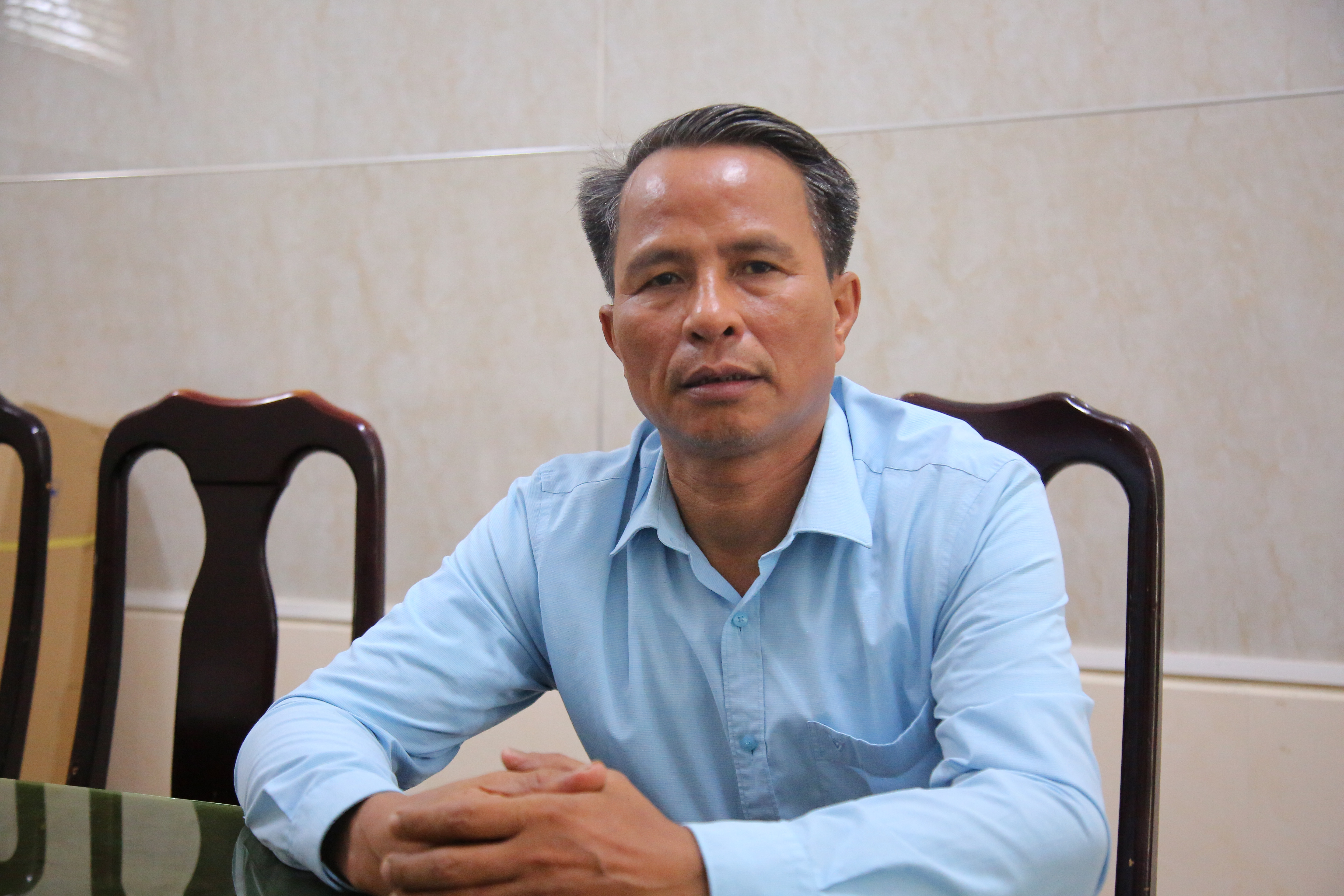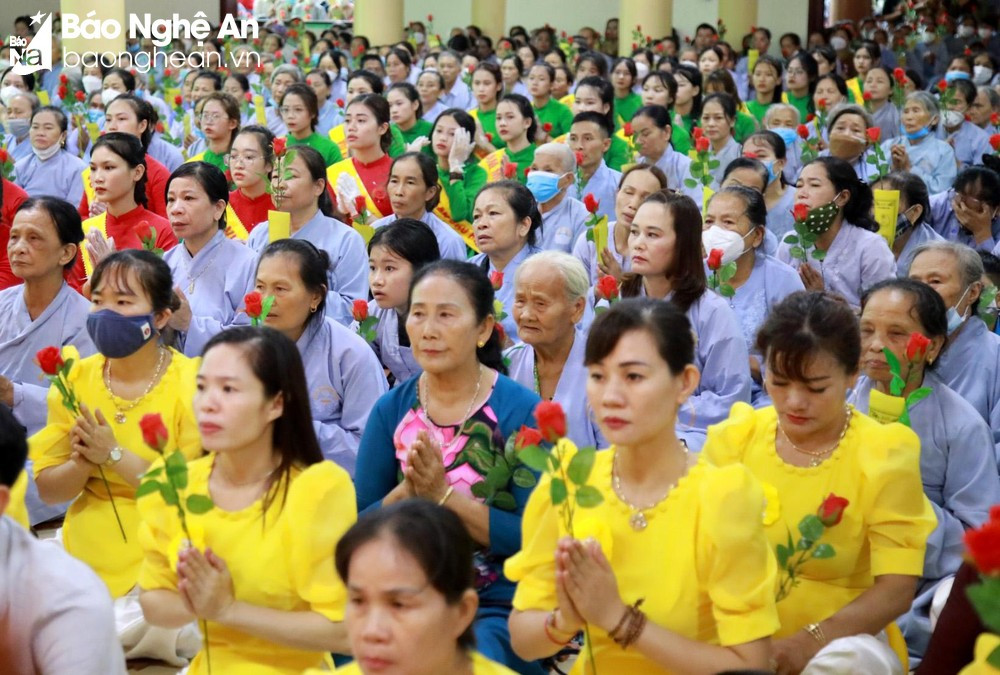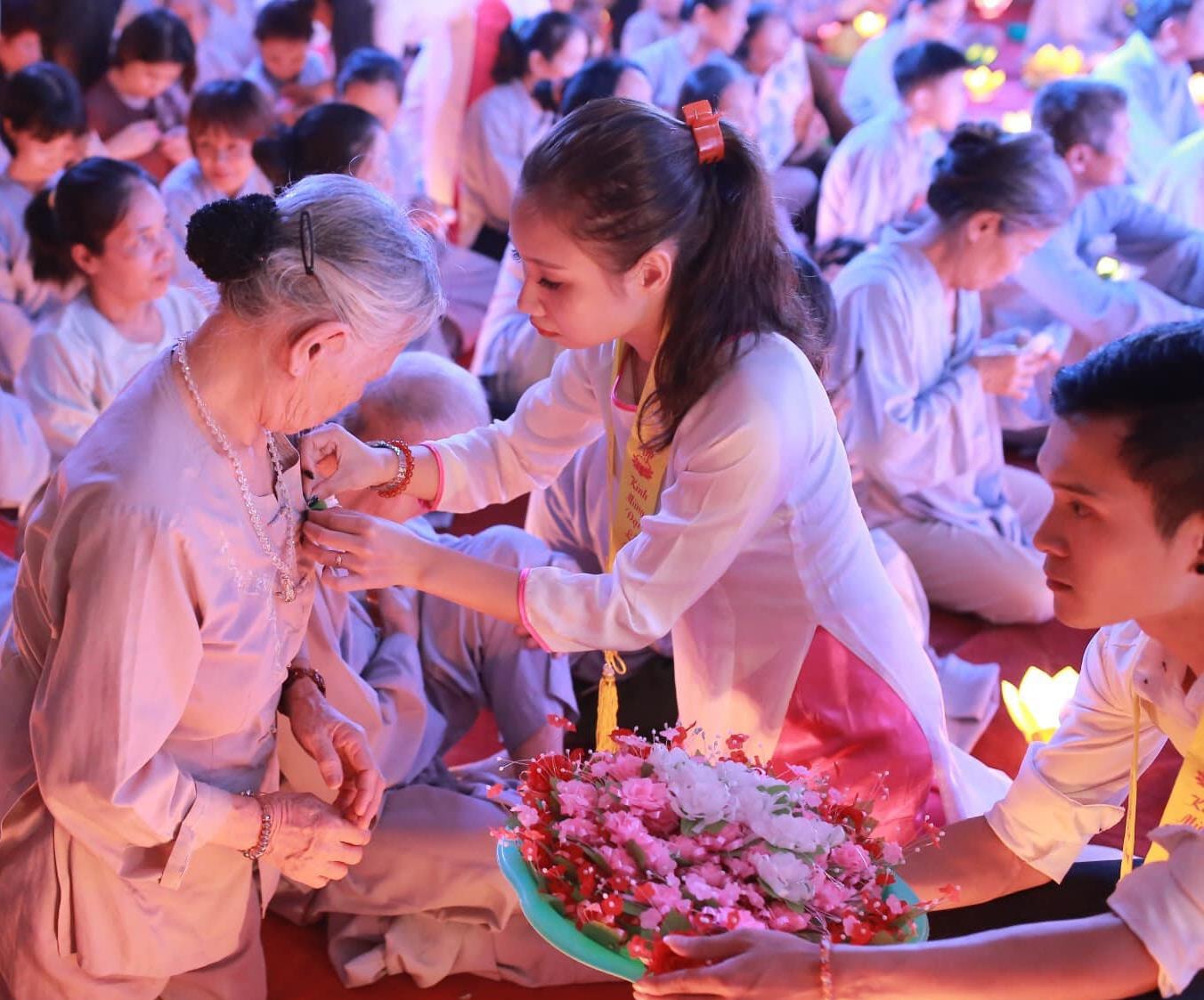Vu Lan Festival: A beautiful cultural belief of Vietnamese people
(Baonghean.vn) - Vu Lan Festival (15th day of the seventh lunar month every year) is one of the main holidays of Buddhism.
Vu Lan has become an annual holiday to commemorate the merits of parents and ancestors, reminding everyone to cherish what they have, reminding children to always remember the merits of their parents and do filial deeds to show love and gratitude.
Regarding this issue, Nghe An Newspaper had a conversation with Associate Professor Dr. Nguyen Quang Hong - Faculty of History, School of Education, Vinh University.
PV: Professor, can you tell us about the history of Vu Lan festival and the Vietnamese people's response to this filial piety?

Associate Professor, Dr. Nguyen Quang Hong:First of all, I would like to talk about the birth of Buddhism in Nghe An and Ha Tinh. According to the latest announcement in March 2023, from the 2nd and 3rd centuries BC, Buddhism was spread at Quynh Vien Pagoda. In Ha Tinh, the person who spread Buddhism was Zen master Thien Quang from India and the first Buddhist was Chu Dong Tu, who later spread Buddhism to his wife Tien Dung. (Since ancient times, Vietnamese people have classified these two characters as the four immortals). So, a question here is why did the Vietnamese people easily accept Buddhism?
Before that, Vietnam had built for itself a brilliant civilization called the Red River civilization or Van Lang, Au Lac civilization. In the values of Au Lac civilization, there is a very good belief which is the custom of worshiping grandparents and ancestors. Since the time of Hung Vuong, Vietnamese people have known how to worship grandparents and ancestors, have believed that rivers have sources, trees have roots and humans have ancestors and race. When people are born, they must remember their ancestors besides the sun gods, mountain gods, and sea gods.

When Buddhism developed, it was passed down that Maudgalyayana, out of love for his mother, found a way to free her from hell, and that story is very suitable for the thoughts and filial piety of all classes in Vietnamese society. And so, the Vu Lan ceremony of filial piety has existed for a long time, it exists in the civilization of Vietnamese people in general and Nghe people in particular.
PV: Vu Lan festival is associated with Buddhism, so sir, when did Buddhism enter the Lam River basin?
Associate Professor, Dr. Nguyen Quang Hong:After Chu Dong Tu was preached by Zen Master Thien Quang, a question arose: did Buddhism develop in the Lam River basin? And it is affirmed that Buddhism in the Lam River basin developed strongly. Evidence of this is the archaeological results of the pagoda in Hong Long commune, Nam Dan district, which found valuable artifacts proving that Buddhism was preached here. In the heart of Nhan Tower, for the first time, archaeologists found a box containing relics, which contributed to affirming that the flow of Buddhism was formed in the Lam River basin very early and had a profound influence on the lives of residents in the Lam River basin.
In Nghe An and Ha Tinh provinces, for various reasons, the revival of Buddhism took place later than in some other provinces and cities. But the important thing is that, along with the process of Buddhist revival, the activities at 127 pagodas in Ha Tinh and 71 pagodas in Nghe An province up to now have been operating in an orderly manner, in accordance with the spirit of the law, as well as deeply reflecting the freedom of religion and belief of all classes of people. This is a very welcome signal, during the Vu Lan ceremony of filial piety or during the Buddha's birthday week, it has received consensus and broad support from all classes of society.
That said, from very early on, Vietnamese people in general and Lam River basin residents in particular have absorbed Vu Lan filial piety for thousands of years, maintained until today and deeply ingrained in the blood and flesh of generations of Nghe people.
PV: So what do we need to understand about Vu Lan week of filial piety, and what is its profound meaning, sir?
Associate Professor, Dr. Nguyen Quang Hong:Some people simply understand that performing the Vu Lan ceremony is for children to follow the example of Buddha Kien Lien to show their gratitude to their grandparents and parents in one way or another. However, in the minds of Vietnamese people in particular, the Vu Lan week of filial piety has a much higher value.
The first,is to repay the upbringing of grandparents and ancestors according to the tradition of the father (as a child, one must first repay the birth).
MondayFor Nghe Tinh people, this is also an occasion to perform rituals to pay tribute to national heroes and those who have contributed to protecting the country, liberating the nation from foreign invaders, reclaiming land, building villages, and creating a happy life for the people.

Another value in the Vu Lan ceremony is that the person performing the ceremony also wishes to thank heaven, earth, and the gods for creating trees, grass, flowers, rivers, streams, ponds, and lakes to feed people. This meaning also has great cultural value.
Secondly, the great poet Nguyen Du in his elegy for ten kinds of living beings mentioned the story of Vu Lan filial piety, which stated that there were people who had no place to rely on at the end of their lives, so they came to the temple to rely on Buddha, and those who died young, died on the street, or died in the market had no one to burn incense for them. Therefore, on the days of Vu Lan week, it can be seen that in district and provincial markets, people often organize altars to worship living beings, with the purpose of bringing fortune to the departed souls. Thus, the value of Vu Lan filial piety ceremony has different cultural meanings, but throughout it is the extremely noble humanistic value that our ancestors have distilled.
PV: Vu Lan Festival is increasingly welcomed by people. In your opinion, is this a cultural feature that has become ingrained in people's lives and is on the rise?
Associate Professor, Dr. Nguyen Quang Hong:Vu Lan ceremony of filial piety is not only held for one day but also for a whole week, attracting a large number of people to participate. From the elderly to the young, everyone participates, from cleaning and decorating the ceremony voluntarily, devotedly and joyfully. Not only adults and the elderly but also young people respond deeply. Not only people in the province but also tourists from inside and outside the province participate. Tourists coming to Nghe An are also very assured that they do not have to return to their hometown to perform Vu Lan ceremony of filial piety, but right in Nghe An they have participated fully, still fulfilling their responsibilities.
PV: The greatest meaning of the Vu Lan ceremony is to help people be good, always cultivate the best qualities, such as filial piety to their parents and grandparents; always remember their roots and have a spirit of gratitude to those who have fallen for the nation. How would you summarize this cultural feature?
Associate Professor, Dr. Nguyen Quang Hong:In Nghe An in particular and the whole country in general, people come to the Vu Lan ceremony with faith, with the happiness of being grateful to their grandparents, ancestors, and those who founded the village in their homeland and passed on that sacred land so that they can have a prosperous life like today. Therefore, we can see on the faces of those who prepare and participate in the Vu Lan ceremony not worries, sadness, not anxiety, but almost happiness and joy, or in Buddhist language, joy from their own souls, expressed outwardly. This is one of the cultural beauties of the Vu Lan week of filial piety that, in my opinion, the government has fully recognized to create favorable conditions for pagodas to organize not only the Vu Lan ceremony but also other rituals solemnly according to the law in the most comfortable and joyful manner. The influence of Vu Lan week of filial piety is becoming more and more profound, this reflects the fact that Buddhism is in the hearts of the nation, always accompanying the nation...
PV: Nowadays, there is a phenomenon of many families setting up elaborate altars for worship, hoping that with high trays and full dishes, they will be able to send many offerings to their grandparents, ancestors, and parents. There are also families who, because of insecurity in life, hope that the underworld will bless and protect them from disasters. How do you evaluate this phenomenon?
Associate Professor, Dr. Nguyen Quang Hong:That's right, this is a phenomenon that, although not many, has been happening in people's lives. Many families with conditions have prepared elaborate ceremonies, set up altars and hired very expensive teachers. Maybe people think that if they prepare a solemn ceremony, their grandparents and ancestors will take note; there are also people who encounter disasters or lose faith in something, so they want to resolve it by thinking that the earthly world is like the afterlife. If we consider freedom of belief, the government does not prohibit it, however, in terms of cultural factors, this is an act that goes against the majority of the people, against traditional customs and traditions. Buddhism belongs to every family, in Buddhist scriptures there is no article or provision that talks about having to prepare this or that ceremony to correspond to the spiritual matters of the owner. The Vu Lan ceremony to show gratitude to parents is an act that everyone, every family can be happy when performing this ritual, whether the ceremony is big or small.
Because since ancient times we have known, our grandparents only had small offerings but always felt secure because their parents and grandparents in the afterlife understood their sincerity. For example, when we were young, our parents only had a tray of betel leaves, a kettle of water and a few corns, sweet potatoes, and cassava to offer to our grandparents and ancestors, but we still felt very warm.
PV: Thank you for the conversation!
